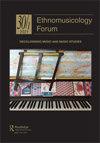“想象中的巴尔干”与“想象中的非洲”相遇:当代塞尔维亚jembe击鼓的实践
IF 0.5
1区 艺术学
0 MUSIC
引用次数: 1
摘要
摘要:本文着重探讨在当代塞尔维亚文化中作为非洲性象征的jembe(djembeé)。玩家的叙述经常强调遥远、浪漫化的非洲的普遍性和精神性,将这些假定的特征与塞尔维亚和巴尔干传统音乐的“古老”方面联系起来。普遍适应性节奏的比喻将不同的参与者团结在一起,从南斯拉夫社会主义后期的跨文化声音先驱到塞尔维亚当今多元文化主义的支持者。本文参考了最近在贝尔格莱德开展的音乐项目“Djeembija”的民族志研究,以及其他当代塞尔维亚音乐家对jembe和其他非洲乐器的使用和讨论。jembe在世界音乐乐队中的使用是意识形态、诗歌和音乐实践多样性的基础。与此同时,与当代资本主义社会繁忙的日常经历形成鲜明对比的是,音乐才能的听觉学习、小规模和“慢节奏”,在塞尔维亚萌芽的跨文化jembe演奏实践中获得了怀旧的共鸣。本文章由计算机程序翻译,如有差异,请以英文原文为准。
‘Imagined Balkans’ meets ‘imagined Africa’: the contemporary practice of jembe drumming in Serbia
ABSTRACT This paper focuses on the jembe (djembé) as a symbol of Africanness in contemporary Serbian culture. Players’ narratives often underline the universality and spirituality of distant, romanticised Africa linking these supposed features to ‘archaic’ aspects of Serbian and Balkan traditional music. The trope of universally adaptable rhythm has united different players, from pioneers of cross-cultural sound during late Yugoslav socialism to the proponents of present-day multiculturalism in Serbia. This paper is informed by ethnographic research with the group Đembija, a recent Belgrade-based music project, and by the use and discourse surrounding the jembe and other African instruments by other contemporary Serbian musicians. The jembe's use in world music bands serves as the basis for a diversity of ideological, poetic and musical practices. Simultaneously, the aural learning, small scale and ‘slow pace’ of musicianship, in contrast to the hectic everyday experience of contemporary capitalist society, acquires nostalgic resonances within Serbia’s budding cross-cultural jembe playing practices.
求助全文
通过发布文献求助,成功后即可免费获取论文全文。
去求助
来源期刊

Ethnomusicology Forum
MUSIC-
CiteScore
1.10
自引率
25.00%
发文量
29
期刊介绍:
Articles often emphasise first-hand, sustained engagement with people as music makers, taking the form of ethnographic writing following one or more periods of fieldwork. Typically, ethnographies aim for a broad assessment of the processes and contexts through and within which music is imagined, discussed and made. Ethnography may be synthesised with a variety of analytical, historical and other methodologies, often entering into dialogue with other disciplinary areas such as music psychology, music education, historical musicology, performance studies, critical theory, dance, folklore and linguistics. The field is therefore characterised by its breadth in theory and method, its interdisciplinary nature and its global perspective.
 求助内容:
求助内容: 应助结果提醒方式:
应助结果提醒方式:


